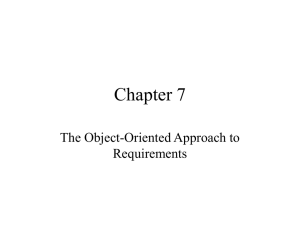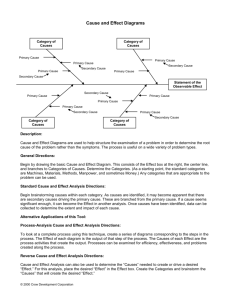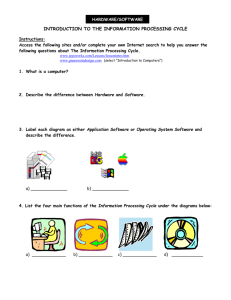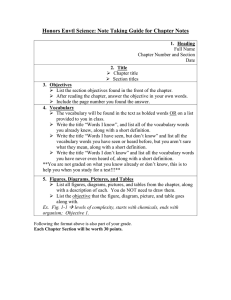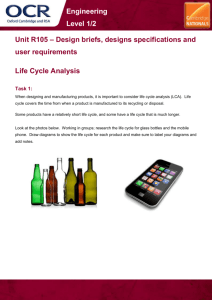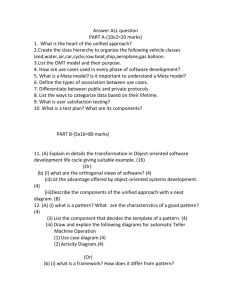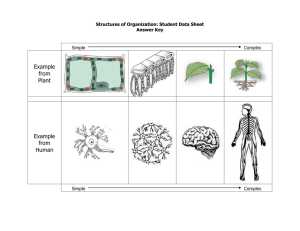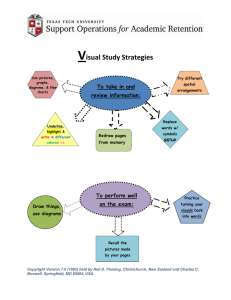American University Department of Computer Science College of Arts and Sciences
advertisement
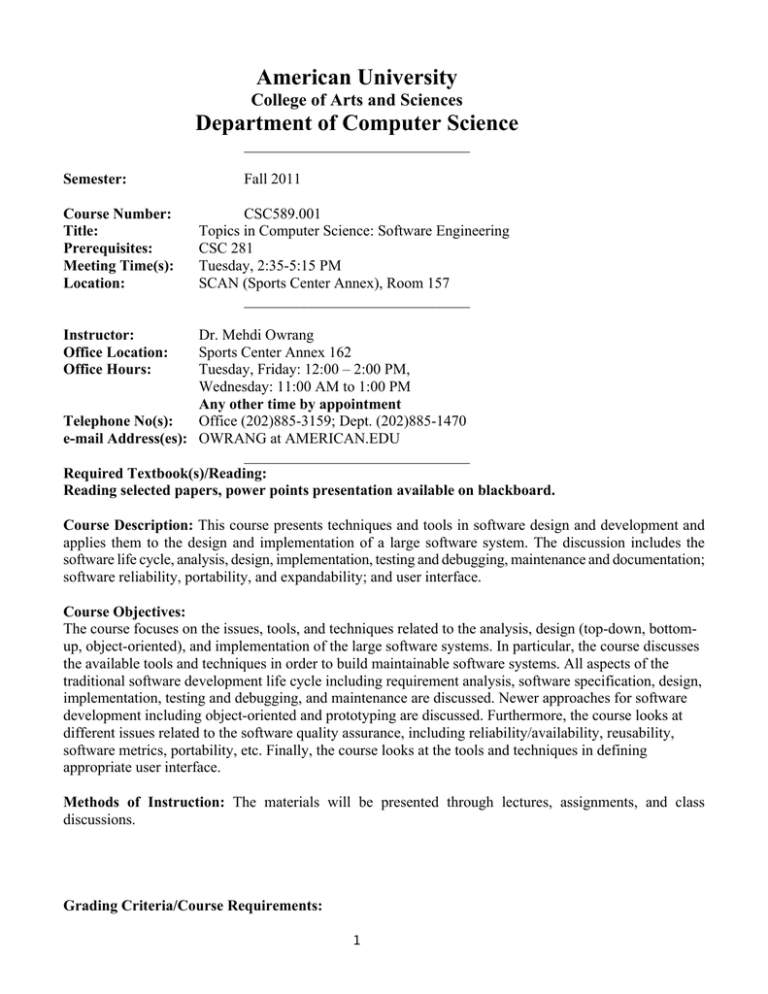
American University
College of Arts and Sciences
Department of Computer Science
______________________________
Semester:
Course Number:
Title:
Prerequisites:
Meeting Time(s):
Location:
Fall 2011
CSC589.001
Topics in Computer Science: Software Engineering
CSC 281
Tuesday, 2:35-5:15 PM
SCAN (Sports Center Annex), Room 157
______________________________
Instructor:
Office Location:
Office Hours:
Dr. Mehdi Owrang
Sports Center Annex 162
Tuesday, Friday: 12:00 – 2:00 PM,
Wednesday: 11:00 AM to 1:00 PM
Any other time by appointment
Telephone No(s):
Office (202)885-3159; Dept. (202)885-1470
e-mail Address(es): OWRANG at AMERICAN.EDU
______________________________
Required Textbook(s)/Reading:
Reading selected papers, power points presentation available on blackboard.
Course Description: This course presents techniques and tools in software design and development and
applies them to the design and implementation of a large software system. The discussion includes the
software life cycle, analysis, design, implementation, testing and debugging, maintenance and documentation;
software reliability, portability, and expandability; and user interface.
Course Objectives:
The course focuses on the issues, tools, and techniques related to the analysis, design (top-down, bottomup, object-oriented), and implementation of the large software systems. In particular, the course discusses
the available tools and techniques in order to build maintainable software systems. All aspects of the
traditional software development life cycle including requirement analysis, software specification, design,
implementation, testing and debugging, and maintenance are discussed. Newer approaches for software
development including object-oriented and prototyping are discussed. Furthermore, the course looks at
different issues related to the software quality assurance, including reliability/availability, reusability,
software metrics, portability, etc. Finally, the course looks at the tools and techniques in defining
appropriate user interface.
Methods of Instruction: The materials will be presented through lectures, assignments, and class
discussions.
Grading Criteria/Course Requirements:
1
Project/Paper
Mid-Exam
Final-Exam
: 40%
: 30%
: 30%
Note: All written work should be prepared with a word processor and run though a spell-checker.
Since all written material is also evaluated for grammar and structure, students are advised to use one
of the many grammar-checkers that are available (the AU laboratories have several grammar checkers
for student use).
Policies:
Class attendance and participation is strongly recommended.
If you have difficulty doing your homework, please let me know so that I can help you. I will not
accept any late homework if you have not talked to me prior to the due date for the homework.
NOTE: If for some reason you have to miss a class, please inform me so that you get the information
about the materials we covered in the class.
Incomplete ('I') Policy:
The policy of the Department, the College of Arts and Sciences, and the University is that the grade of
Incomplete (I) is rarely given. Department approval for a grade of I is only granted in unusual,
documented circumstances. A grade of I is not approved in instances where students were unable to
complete the course work.
Laboratory Hardware/Software Requirements:
Incomplete ('I') Policy:
The policy of the College of Arts and Sciences and the University is that the grade of Incomplete (I) is
rarely given. Department approval for a grade of I is only granted in unusual, documented
circumstances. In such rare instances, the student must make arrangements with the instructor before
the final exam. A grade of I is not approved in instances where students were unable to complete the
course work.
Academic Integrity:
The Academic Integrity Code for the American University describes standards for academic conduct,
rights and responsibilities of members of the academic community, and procedures for handling
allegations of academic dishonesty. Academic dishonesty as defined by the Code includes, but is not
limited to: plagiarism, inappropriate collaboration, dishonesty in examinations (in-class or take-home),
dishonesty in papers, work done for one course and submitted to another, deliberate falsification of
data, interference with other students' work, and copyright violations (including both document and
software copyrights). Copies of the Academic Integrity Code are available from the Office of the
University Registrar.
Plagiarism is defined as taking the language, ideas, or thoughts of another, and representing them as
your own. If you use someone's ideas, cite them; if you use someone's words; clearly mark them as a
quotation. Plagiarism includes using another's computer programs or pieces of a program. Consult
one of the many "writer's guides" that are available in the library and bookstores for citation practices.
2
All instances of plagiarism will be reported to the Dean of the College of Arts and Sciences for
appropriate action.
Student Services:
If you experience difficulty in this course for any reason please don’t hesitate to contact me. In
addition to the resources of the department there exists a wide range of services available to
support you in your efforts to successfully complete this course.
•
•
•
•
Learning Services (x3360, MGC 201) LS offers study skills workshops, individual
instruction, tutor referrals, and services for students with learning disabilities.
Psychological Services (x3360, MGC 201) offers counseling and consultations regarding
personal concerns, self-help information, and connections to off-campus mental health
services.
Disability Support Services (x3315, MGC 120) DSS offers technical and practical support
and assistance with accommodations for students with physical or psychological
disabilities.
Assistance is available on campus for students who wish to improve their writing skills
(Writing center 202.885.2991).
If you have a disability and might require accommodations for this course please notify me with a
letter from DSS or LS as early as is convenient, so that we may make appropriate arrangements to
address your needs.
Supplemental References:
3
Course Outline:
- Introduction to Software Engineering
- Issues/ Difficulties
- Software Life Cycle
- Software Requirements Definitions
- Data Flow Diagrams
- Software Requirements Analysis
- Software Specifications
- Software Design
- Functional Design
- Top-Down, Bottom-Up
- Structured Charts
- Maintainable Design (Coupling and Cohesion)
- Object-Oriented Design
- Prototyping
- Software Implementation
- Programming Languages
- Hardware Components
- Software Tools
- Software Testing and Debugging
- Software Maintenance
- Software Reliability
- Software Portability
- Software Reusability
Object-Oriented Design Using UML:
Introduction to UML Diagrams
Object Diagrams
Classes
Associations
Class Diagrams
Use Cases
Use Case Diagrams
Interaction Diagrams
Activity Diagrams
State Chart Diagrams
Components and Deployment
- Future Direction of Software Development
4
